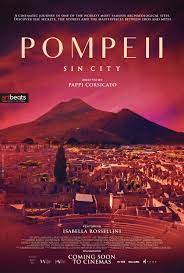
POMPEII – SIN CITY/ POMPEII, EROS E MITO
Italy, 2020, 80 minutes, Colour. Isabella Rossellini, Darius Arya, Andrew Wallace-Hadrlle, Ellen O’Gorman, Catherine Edwards, Massimo Osanna.
Directed by Pappi Corsicato.
Yes, a film with a visit to the ruins of Pompeii but not exactly in the way we might have expected. Interest in and enjoyment of this film will depend on what we had hoped to see. It turns out to be something of a mixture of documentary, travelogue, exploration of the subtitle, Sin City (although the original Italian title does not emphasise sin but rather highlights the relationship between the Myths and Eros), and some contemporary re-enactments of the myths seen on the frescoes that have survived, the reputation of the cities of Pompeeii and Herculanaeum, the eruption of Mount Vesuvius in 79 A.D., the overwhelming of the cities and their populace, but the extraordinary heritage of ruins that have survived more than 1900 years. In fact, there is some explanation but it comes in the last part of the film, a reflection on what has been explored, and a close-up of the mystery of the of the identity of the famous surviving skeletons.
For those who want visuals of Pompeii, walks through the columns, the remains of the homes, viewing the frescoes, and a range of drone views from above as well as a final visit to the barren craters of Vesuvius, plenty to satisfy.
For those who want some experts commenting on Pompeii, Roman civilisation, Roman culture and decadence (plenty of that), there is a range of academics from England and the United States interspersed throughout the film, some appealing, some bit off-putting. But, the main commentary is given to Isabella Rossellini (looking more and sounding more like her mother, Ingrid Bergman, as she grows older), who walks through the city, a distracting green coat, speaking, inviting us in, giving us some winks.
There is a lot (more than a lot) of talk about lust, power, sex, decadence. The emphasis, even from Isabella Rossellini, becomes rather tiresome. But, a lot of points are made about the city, the violence of the gladiators in the arena built in 70 A.D., the decree of the Roman Senate banning combat for 10 years, stories about Nero’s self-aggrandising wife, Poppaea.
But the part that many audiences might say they could do without are the contemporary suggested re-enactments of various Greek and Roman myths from the frescoes, Leda and the Swan, Theseus and Ariadne, Bacchus, the Gladiators… all by very contemporary looking performers in contemporary clothes, some, some evocative, some provocative. On the other hand, some audiences will enjoy their comment on the myths.
So, perhaps best if an audience is prepared to know there is plenty that they might enjoy – and some aspects that they might question.